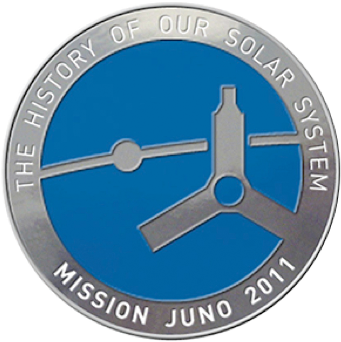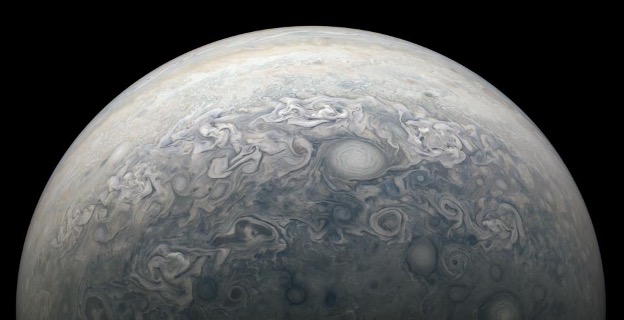

Polar view of Jupiter by Juno JUNOCAM at Perijove 72.
Credit: NASA/JPL-Caltech/SwRI/MSSS/Kevin M. Gill © CC BY
Credit: NASA/JPL-Caltech/SwRI/MSSS/Kevin M. Gill © CC BY
Description
Juno is a spin-stabilized spacecraft, powered by 3 large, deployable rigid-panel arrays that can be moved to adjust the spin axis relative to the high gain antennae boresight. The spacecraft utilizes high energy density Li ion batteries for battery-regulated bus voltage. Basic radiation protection for sensitive electronics is afforded by a titanium-walled vault. Telecom is achieved with X-band uplink and downlink. Ka-band telecom is included for improved Doppler measurement performance
References
Kim, B., Kwon, G., Kim, K., & Ye, J. C. 2024, in ICLR
Punnappurath, A., Abuolaim, A., Abdelhamed, A., Levinshtein, A., & Brown, M. S. 2022, in Proceedings of the IEEE/CVF Conference on Computer Vision and Pattern Recognition (CVPR)
Simon, A. A., Wong, M. H., & Orton, G. S. 2015, The Astrophysical Journal, 812, 55, https://doi.org/10.1088/0004-637X/812/1/55">doi: 10.1088/0004-637X/812/1/55
Zhu, J.-Y., Park, T., Isola, P., & Efros, A. A. 2017, in Computer Vision (ICCV), 2017 IEEE International Conference on ??????????
Accessing the Data
The data has 2 components:
The User’s guide
Calibrated Index (csv)
Mosaic Index (csv)
Citations
PDS recommendations for citing data sets can be found here.
Georgakis, G., S. Ramanakumar, E.K. Dahl (2025). JunoCam - Machine Learning Calibration Bundle, NASA Planetary Data System, https://www.doi.org/10.17189/ryea-mj65.
Punnappurath, A., Abuolaim, A., Abdelhamed, A., Levinshtein, A., & Brown, M. S. 2022, in Proceedings of the IEEE/CVF Conference on Computer Vision and Pattern Recognition (CVPR)
Simon, A. A., Wong, M. H., & Orton, G. S. 2015, The Astrophysical Journal, 812, 55, https://doi.org/10.1088/0004-637X/812/1/55">doi: 10.1088/0004-637X/812/1/55
Zhu, J.-Y., Park, T., Isola, P., & Efros, A. A. 2017, in Computer Vision (ICCV), 2017 IEEE International Conference on ??????????
Accessing the Data
The data has 2 components:
Data calibrated, A series of tif files of images for individual orbits
Data mosaics, A series of fits files
Data mosaics, A series of fits files
The User’s guide
Calibrated Index (csv)
Mosaic Index (csv)
Citations
PDS recommendations for citing data sets can be found here.
Georgakis, G., S. Ramanakumar, E.K. Dahl (2025). JunoCam - Machine Learning Calibration Bundle, NASA Planetary Data System, https://www.doi.org/10.17189/ryea-mj65.
 PDS: The Planetary Atmospheres Node
PDS: The Planetary Atmospheres Node

